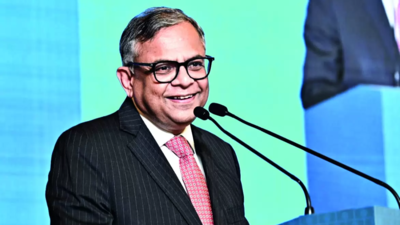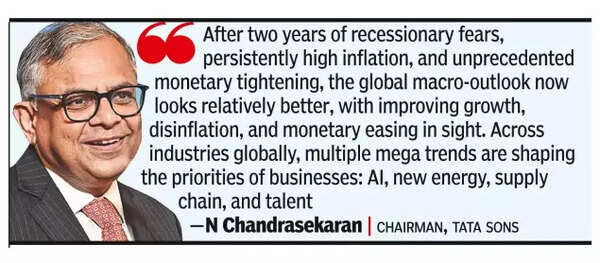- News
- Business News
- India Business News
- India plays a key role in advanced manufacturing: Chandra
Trending
India plays a key role in advanced manufacturing: Chandra
"Geopolitical challenges continue to alter established supply chains, and companies are rebalancing their supply chains to address both resilience and efficiency. New global ecosystems are being created, with India playing an important role in advanced manufacturing," Chandrasekaran, who is also TCS chairman, wrote to tech major's shareholders. He mentioned that the global environment continues to undergo significant shifts.

N Chandrasekaran
BENGALURU: Tata Sons chairman N Chandrasekaran has said that new global supply chain ecosystems are emerging, and India is playing a crucial role in advanced manufacturing.
"Geopolitical challenges continue to alter established supply chains, and companies are rebalancing their supply chains to address both resilience and efficiency. New global ecosystems are being created, with India playing an important role in advanced manufacturing," Chandrasekaran, who is also TCS chairman, wrote to tech major's shareholders.

He mentioned that the global environment continues to undergo significant shifts.Following the pandemic, which resulted in supply chain shocks, there was an economic slowdown, especially in developed markets. "While initial signs of stability began to emerge, military conflicts have further intensified this year and continue to impact global supply chains," Chandrasekaran said.
"After two years of recessionary fears, persistently high inflation, and unprecedented monetary tightening, the global macro-outlook now looks relatively better, with improving growth, disinflation, and monetary easing in sight. Across industries globally, multiple mega trends are shaping the priorities of businesses: AI, new energy, supply chain, and talent," he wrote in the letter.
Chandrasekaran said GenAI would impact almost every sector as well as country going forward. "Enterprises have already invested in cloud, data infrastructure, and large processing power, which will aid AI/GenAI. GenAI will not only improve productivity, but also create impact we hitherto have not seen or imagined."
In FY24, TCS CEO K Krithivasan received a compensation of Rs 25.3 crore, making him one of the lowest-paid CEOs among his peers in the Indian IT sector. His predecessor, Rajesh Gopinathan, drew Rs 29.2 crore as total remuneration for FY23. In comparison, Infosys CEO Salil Parekh and Wipro's new CEO Srini Pallia earned Rs 56 crore and Rs 50 crore respectively. TCS COO N Ganapathy Subramaniam, who is set to retire in May, received a remuneration of Rs 26 crore in FY24 - an 8.2% increase compared to the year before. The median remuneration of employees at TCS increased by 10.8% in FY24.
The average annual salary hike was from 5.5% to 8%, with top performers receiving double-digit increments in India. However, during the last fiscal, the total increase was between 7-9% after accounting for promotions and other event-based compensation revisions.
"Geopolitical challenges continue to alter established supply chains, and companies are rebalancing their supply chains to address both resilience and efficiency. New global ecosystems are being created, with India playing an important role in advanced manufacturing," Chandrasekaran, who is also TCS chairman, wrote to tech major's shareholders.

He mentioned that the global environment continues to undergo significant shifts.Following the pandemic, which resulted in supply chain shocks, there was an economic slowdown, especially in developed markets. "While initial signs of stability began to emerge, military conflicts have further intensified this year and continue to impact global supply chains," Chandrasekaran said.
"After two years of recessionary fears, persistently high inflation, and unprecedented monetary tightening, the global macro-outlook now looks relatively better, with improving growth, disinflation, and monetary easing in sight. Across industries globally, multiple mega trends are shaping the priorities of businesses: AI, new energy, supply chain, and talent," he wrote in the letter.
Chandrasekaran said GenAI would impact almost every sector as well as country going forward. "Enterprises have already invested in cloud, data infrastructure, and large processing power, which will aid AI/GenAI. GenAI will not only improve productivity, but also create impact we hitherto have not seen or imagined."
In FY24, TCS CEO K Krithivasan received a compensation of Rs 25.3 crore, making him one of the lowest-paid CEOs among his peers in the Indian IT sector. His predecessor, Rajesh Gopinathan, drew Rs 29.2 crore as total remuneration for FY23. In comparison, Infosys CEO Salil Parekh and Wipro's new CEO Srini Pallia earned Rs 56 crore and Rs 50 crore respectively. TCS COO N Ganapathy Subramaniam, who is set to retire in May, received a remuneration of Rs 26 crore in FY24 - an 8.2% increase compared to the year before. The median remuneration of employees at TCS increased by 10.8% in FY24.
The average annual salary hike was from 5.5% to 8%, with top performers receiving double-digit increments in India. However, during the last fiscal, the total increase was between 7-9% after accounting for promotions and other event-based compensation revisions.
End of Article
FOLLOW US ON SOCIAL MEDIA















